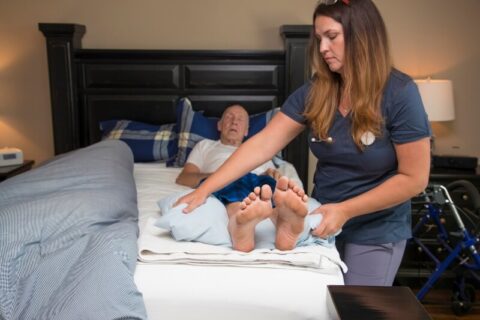When a Hospice Patient Dies at Home
When a Patient Dies at Home
In home hospice can be a wonderful thing for terminally ill patients and their families, giving the patient the opportunity to face the end of life with dignity, in familiar surroundings. But what happens when a hospice patient dies at home? This is not an unexpected event, but it can help to be prepared for what happens after a patient dies while receiving hospice care at home.
Death is a Natural Process
There is no set way for a death to occur, and there are no rules for how to die. For that matter, there are no rules for family members on how to witness the death of a loved one, whether in the final moments or the final months. Sometimes, family members are present during the end stages of a patient’s life, but not with the patient at the time of death. However, this does not mean that their presence does not remain with their loved one. Dying is not as much an event as it is a process. It is impossible to predict how a person’s final days will unfold, but it is important to have a general idea of what to expect, so that those last days will be as meaningful as possible.
What are the signs that a patient is actively dying?
When a loved one is in the final stages of their life, it can be a challenging and emotional time for everyone involved. Understanding the signs that someone is actively dying can help families and caregivers provide the best possible care and support during this difficult period. Some common signs that indicate a person is nearing the end of their life and discuss how hospice care can help ensure comfort and dignity during this time.
- Physical Changes:
As a person approaches the end of their life, there are several physical changes that may occur. These can include:
– Decreased appetite and thirst: The body’s need for nourishment decreases as it prepares for the end. It is important to respect the person’s wishes regarding food and fluids during this time.
– Changes in breathing: Breathing patterns may become irregular, shallow, or laboured. This is often referred to as “Cheyne-Stokes” breathing. Hospice nurses can provide guidance on how to make the person more comfortable during these changes.
– Decreased mobility: As the body weakens, the person may become less mobile and spend more time in bed or a reclining chair. It is important to ensure their comfort and prevent pressure sores.
- Cognitive and Emotional Changes:
In addition to physical changes, there may also be cognitive and emotional changes as a person nears the end of their life. These can include:
– Confusion or disorientation: The person may become confused or disoriented, having trouble recognizing people or places. This can be distressing for both the individual and their loved ones, but it is a normal part of the dying process.
– Increased sleepiness: The person may spend more time sleeping or appear drowsy. This is the body’s way of conserving energy as it prepares for the end.
– Withdrawal and decreased communication: As the person’s energy levels decline, they may withdraw from social interactions and communicate less. It is important to respect their need for solitude while still providing emotional support.
- Emotional and Spiritual Changes:
As someone approaches the end of their life, there may be profound emotional and spiritual changes. These can include:
– Reflecting on life and finding closure: Many individuals nearing the end of their life experience a period of reflection and may seek closure with loved ones. Hospice care can provide support and guidance during this important time.
– Increased need for emotional support: The emotional toll of facing mortality can be overwhelming. Hospice teams are trained to provide emotional support to both the patient and their loved ones.
– Spiritual exploration: Some individuals may experience a deepening of their spiritual beliefs or a desire to explore their spirituality further. Hospice care can provide resources and support for spiritual needs.
Recognizing the signs that someone is actively dying can help families and caregivers provide the best possible care and support during this challenging time. Hospice care is designed to ensure comfort, dignity, and emotional support for both the patient and their loved ones. By understanding these signs and seeking the assistance of a hospice team, families can navigate the end-of-life journey with compassion and grace.
It is Important to Say Goodbye.
When a loved one is dying, it is an emotionally trying time. However, saying goodbye is an important part of the grieving process. Even if your loved one is no longer conscious, saying goodbye can be meaningful, because research indicates that hearing can be the last sense to go when a person is actively dying. When you realize that your loved one is reaching the end of his or her life, take the opportunity to say the things that are in your heart. It can be daunting to allow yourself to be vulnerable, but later you will be glad that you shared your feelings with the person before it was too late. During the final days of a person’s life, it can also be good to reminisce, as this allows you to connect in a significant way.
Grieving is a process that is different for different people.
When you are experiencing the death of a loved one, it can be easy to neglect self-care. However, during this emotionally difficult time, during which you are processing your loved one’s death, it is important to take care of yourself. Be gentle with yourself, and recognize that grieving takes time, and your process may be different from other people’s, even those who have experienced the loss of the same person.
What happens after a hospice patient dies at home?
- Your first step will be to call hospice. Medicare hospice benefits give patients’ families the right to bereavement support from their for at least a year after the death of their loved one. This includes comfort and assistance with bereavement, along with aiding in the arrangement of the funeral and spiritual support.
- Death should be officially pronounced as quickly as possible. A doctor or hospice clinician can do this, as well as filling out the necessary papers certifying the time, place, and cause of death. The reason it is important for this to be done in a timely manner is that it is the start of the process of issuing a death certificate. The death certificate is necessary for handling things like life insurance matters and financial issues.
- Locate advanced directives quickly. If your loved one has been in hospice care, it is likely that you have already addressed the issue of an advanced directive. Advanced directives are important prior to death, because they outline the patient’s wishes in regard to end of life care, but they are also necessary after death, as they may include things like organ donor information. Time is of the essence at that point, because preserving organ function for donation can only be done in a short time frame.
- Coordinate with the funeral home for body transportation. Your hospice provider can help connect you with a funeral home that suits your family’s needs and preferences. Anticipating the need for body transportation ahead of time can make the process less stressful when the time comes.
- Hospice care providers can help you share the news. Reaching out to family members, doctors, an employer, and so on can be stressful. If you would like your hospice team’s help with this, let them know, and they will assist in a sensitive and considerate way.
For Questions about Hospice, Contact Agape Hospice NW
If you are looking for compassionate hospice care for your loved one, Agape Hospice NW is a wonderful option. Accredited by The Joint Commission, Agape strives to help our patients to live the remainder of their lives to the fullest, by improving quality of life not only for our patients but also for their families. The Joint Commission is nationally recognized as the gold standard in health care, and Agape has met the organization’s enhanced requirements for patient safety and quality of care. We provide social workers, spiritual counselors, volunteers, bereavement counselors, and certified hospice aides, all under the direction of a medical director who is responsible for ensuring that the patient’s wishes are honored and that each patient is receiving the highest level of care. We also provide registered nurses experienced in helping during this emotional time, as well as assessing the needs of the patient. For more information about how we can help, call (503) 628-9595 or contact us through our website.


